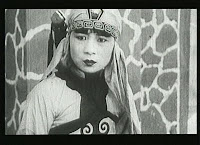 I am very much looking forward to Reel Asian’s Centrepiece Presentation: Red Heroine. This silent film from 1929 tells the story of Yun Mei, a young woman whose village has been destroyed and whose family has been killed by the military. She is saved by a taoist hermit, who helps train her in the art of hand and sword fighting. Now, if this isn’t enough to hook you in… I have more. The film’s presentation this Friday, Nov. 13th @ the Royal Cinema will be accompanied by a new live score by the Devil Music Ensemble (DME).
I am very much looking forward to Reel Asian’s Centrepiece Presentation: Red Heroine. This silent film from 1929 tells the story of Yun Mei, a young woman whose village has been destroyed and whose family has been killed by the military. She is saved by a taoist hermit, who helps train her in the art of hand and sword fighting. Now, if this isn’t enough to hook you in… I have more. The film’s presentation this Friday, Nov. 13th @ the Royal Cinema will be accompanied by a new live score by the Devil Music Ensemble (DME).

Hye: After forming Devil Music Ensemble (pictured right) in 1999, how did you decide to focus on modern classical music?
Jonah/DME: We actually don’t focus on modern classical music. We have always done a variety of different things….improv, rock, modern classical, country, eastern European, other things. We have a love of many different types of music and love exploring it in as many ways as possible. Doing music for film has provided a great medium for exploring different types of music. We did an all original country music score to a silent western. For our Nosferatu score we blended together modern classical sounds with gypsy and rock sounding music. The Red Heroine project allowed us to explore classical and traditional folk music of China as well as the sounds of Kung Fu soundtracks from the 70’s.
Hye: How soon after you had your full ensemble did you realize you were interested in scoring silent films?
Jonah/DME: We came to do live music soundtracks to silent film very randomly…starting as a improv kind of rock band that would sometimes have old silent films projected simultaneously as a background and sometimes thing that would influence of the direction of the improvisation. Later someone asked us to score a silent of our choosing for a festival called “Celluloud” which was rock bands scoring old silent films. We did that show and it was such an inspiration for writing original music, and the show was such a success that the next time we toured, we decided to try to really take some time and write a score for a silent film and see if we could do shows at movie theaters..that went well and we just kept going.
Jonah/DME: The first thing we do is watch the film and take notes on our impression of what kinds of things we’d like to try to do for the music. We never refer to any historical record of music that was used for these particular films. We have this amazing blank slate in which to make our own musical world.We then score the silent film basically second to second and take months collectively composing the music for them. Each scene and cut within each scene is considered when making music for the overall feeling, mood, and action.
Hye: For Red Heroine, how long did it take to complete the score, beginning to end?
Jonah/DME: It took around 3 – 4 months of research, jamming, composing, arranging, and practicing.
Hye: Finally, for someone like myself, who has not seen Red Heroine, what can you share about the experience of the film accompanied with live music?
Jonah/DME: The film really comes to life. The drama, action, comedy, and setting are given an aural context that helps shape the viewing experience. There are pulse quickening rhythmic explosions, and music used to make the action of a scene funnier or more strange, music used to heighten a tragedy that is taking place, or make a scene more tense. So many things. Often the music and the visual become so intertwined that audiences forget that their is a band in the same room performing live. Our music is doing what dialogue and sound design do for a movie with sound.
Hye: I’m very much looking forward to seeing the film and hearing DME play its score live on Friday night. Thanks again for your time and enjoy your time in Toronto.
Jonah/DME: Thanks


